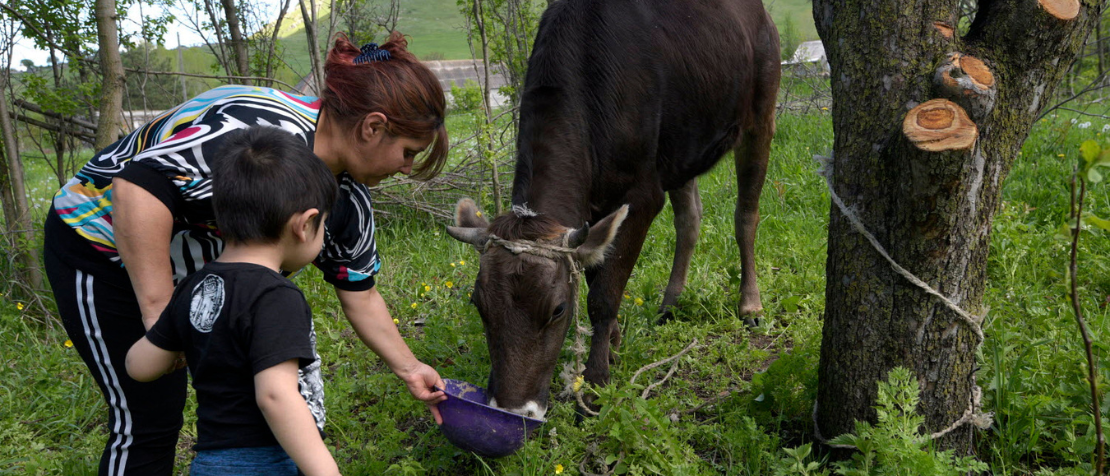FAO, WHO focus on food safety and One Health

©FAO/Karen Minasyan
Food safety saves lives. It is not only a crucial component of food security, but it also plays a vital role in reducing foodborne diseases that are estimated to affect every year 23 million people in Europe and Central Asia only. Food standards provide the basis for food safety. They are the norms, rules, and principles – agreed by experts and scientists – that define what is safe to eat and what isn’t. These standards apply to food production, trade, and processing, and all the stages of a food value chain from the farmers to consumers.
One Health is an approach that aims to integrate and balance the health of people, animals and ecosystems. It is founded on the concept that the health of humans, domestic and wild animals, plants, and the environment are closely linked and inter-dependent.
To address this topical issue, and provide a platform for discussing the linkages between One Health and food safety, FAO Regional Office for Europe and Central Asia and WHO Regional Office for Europe (EURO) jointly organized a webinar for Europe and Central Asia on 28 June, 2023. The virtual event was one of many events held across the world to mark World Food Safety Day (7 June).
“Food safety authorities have long worked to manage food safety issues through a set of key principles including a risk-based approach, applying controls from farm to fork, and collaborating across sectors and stakeholder groups. One Health can help to consolidate these efforts further.” said Raimund Jehle, Regional Programme Leader, FAO Regional Office for Europe and Central Asia, in his welcoming remarks.
“Every year, in the WHO European region, an estimated 23 million people get ill and 5 000 people die from consuming unsafe food,” emphasized Gerald Rockenschaub, Regional Emergencies Director, WHO EURO. “Considering the interconnectivity between food and the environment, the One Health approach is truly critical to addressing food safety; and food safety is critical to promote One Health.”
In her keynote presentation, Katinka de Balogh, Senior One Health Specialist, brought up the successful prevention and control of brucellosis with following One Health approach in Central Asia and Balkan regions. She noted that joint outbreak investigations, tracing back to the origin of foodborne outbreaks, and prioritization of resources and interventions through risk-based assessments are amongst the key requirements.
Among the speakers Alberto Mantovani, Member of Technical Advisory Group for One Health at WHO EURO, highlighted the role of the environment both as the source of hazards, but also the recipient of pollutants, contaminants and waste due to agrifood system activities. He gave the examples of microplastics occurring in aquatic products, and improper use of antibiotics in food production. Carlos des Neves, Chief Scientist of the European Food Safety Authority, considers One Health as the work of “One Team”, and noted the need for capacity building of the team and, using the tools available to achieve more together.
Experts from various sectors shared insights and practical examples of operationalizing the One Health approach. Dirk Lange, former Head of the Multilateral International Relations Unit in the European Commission's Directorate-General for Health and Food Safety, called the Codex Alimentarius an “integral part” of the One Health approach in advising and giving recommendations within its mandate. He was followed by Jeta Deda, General Director of the National Food Authority, Albania, who emphasized the significant progress made by the Authority in data management and use in line with the principles of One Health to manage food-animal-plant health related risks.
Giorgi Chakhunashvili from the One Health Division of the National Center for Disease Control and Public Health, Georgia informed the panel that similar to many other countries, Georgia is developing a national action plan on One Health and food safety is an integral part of it. He noted the key role of surveillance and communication among veterinary, food safety and human health authorities to ensure sustainable and long-term results.
Reflecting on the webinar, co-moderator Mary Kenny, FAO Food Safety and Consumer Protection Officer remarked “the webinar outlined the linkages between One Health and food safety, and she encouraged food safety practitioners to engage in One Health activities and multidisciplinary work at country level to prevent and manage food safety risks which can be sourced to animals, plants and the environment”.
Co-moderator Peter Sousa Hoejskov, WHO Technical Officer for Food Safety and Zoonotic Diseases noted “Through the One Health Regional Coordination Mechanism, FAO and WHO are working to promote a dialogue among the various sectors responsible for human, animal, and environmental health, including food safety, veterinary science, public health, and environmental science. This webinar contributed to that effort to find innovative solutions to existing and emerging problems together.”
30 June 2023, Budapest, Hungary
